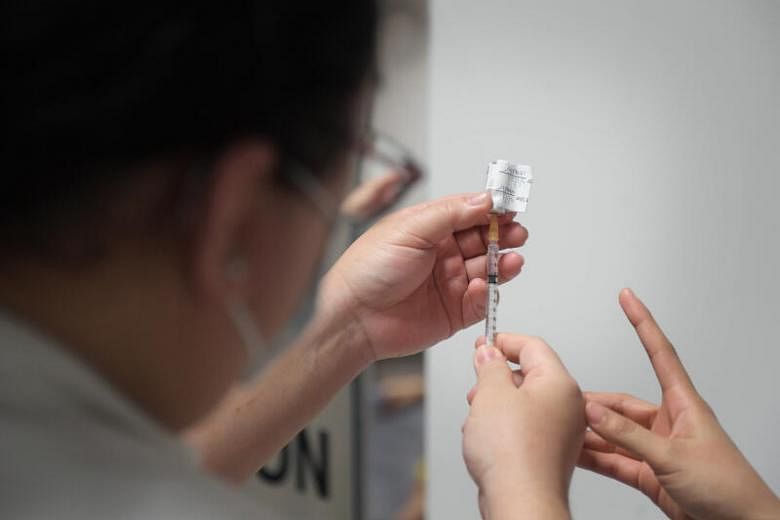SINGAPORE - Covid-19 vaccines like the Pfizer-BioNTech one being used in Singapore are likely to remain effective against new variants of the coronavirus, including recent strains detected in Britain and South Africa.
Infectious diseases expert Ooi Eng Eong of the Duke-NUS Medical School said this is because the vaccines enable the body to produce antibodies against the whole of the spike protein that the virus uses to infect human cells, while the mutations are mostly occurring only on the tip of the protein.
"Over time, more of the virus will evolve, but there are some parts that have to be conserved. Not everything can change," he told The Straits Times.
Two recent variants causing concern among health authorities around the world include the B.1.1.7 strain first detected in Britain, and the 501.V2 strain first seen in South Africa. These variants share a mutation affecting the tip of the spike protein, which helps the virus bind to human cells more effectively and could make the virus more contagious.
"Think of it as a key getting into a lock. The mutations happening change the shape of the key and that affects how it slots into the lock. It's getting better at getting into the lock," said Prof Ooi.
But binding to the human cell is only the first step in infecting it, he noted.
"The protein actually literally needs to turn - the scientific term is conformation - for the inside of the virus can be released into the cell. Otherwise, the shell is still in place and the heart of the virus cannot get into the cell."
Prof Ooi said the parts of the spike protein that enable it to turn the "key" in the "lock", and thereby release the core of the virus into the cell, have not changed and cannot change too much.
"The reason is that they are in contact with many other parts. If it mutates, the entire structure will collapse," he noted.
"The vaccine can generate antibodies against those parts of the virus that are really critical for the infection process, making it very hard for the virus to escape from the immunity developed."
Dr Michel Nussenzweig, an immunologist at Rockefeller University in New York, said existing vaccines will still prevent serious illness and people should continue to be vaccinated, the New York Times reported last Wednesday.
A study led by Dr Nussenzweig tested antibodies from patients who had received either the Pfizer-BioNTech vaccine or another vaccine developed by Moderna and found a slight decrease in their effectiveness against virus samples with three of the key mutations seen in the South African variant.
But this is "not something that we should be horribly freaked out about", he told the NYT.
The Pfizer-BioNTech Covid-19 vaccine has already been shown to be effective against the B.1.1.7 variant, according to lab results published by the two companies.
The results, which have yet to be peer-reviewed, were published on the medical preprint website bioRxiv last Tuesday (Jan 19).
"Further data are needed to monitor the Pfizer-BioNTech Covid-19 vaccine's effectiveness in preventing Covid-19 caused by new virus variants," the companies said in a joint statement last Wednesday.
"So far, for Covid-19 vaccines, it has not been established what reduction in neutralisation might indicate the need for a vaccine strain change."
The statement added that the messenger RNA (mRNA) technology used in the vaccine is well suited to adjustments against new future variants if necessary.
Prof Ooi said that even if a tweak is needed, it will simply involve taking the mRNA sequence of the new emerging strain and putting it into the vaccine. He said it will not require trials that are as extensive as what has already been done so far.
"The trials will just have to show that the vaccine is safe, and that it can produce the same kind of immune response that the original vaccine could. It doesn't actually have to go through a phase three trial again."
Prof Ooi added that Singaporeans need not worry about the mutations being reported or possibility of having to alter the vaccine in the near term.
"It's more important that we make sure that the vaccine is rolled out effectively, that the uptake is high, that we spend sufficient resources to counter misinformation and make sure that decisions about whether to receive the vaccine or not are made with facts."
Correction note: This article has been updated for accuracy.












